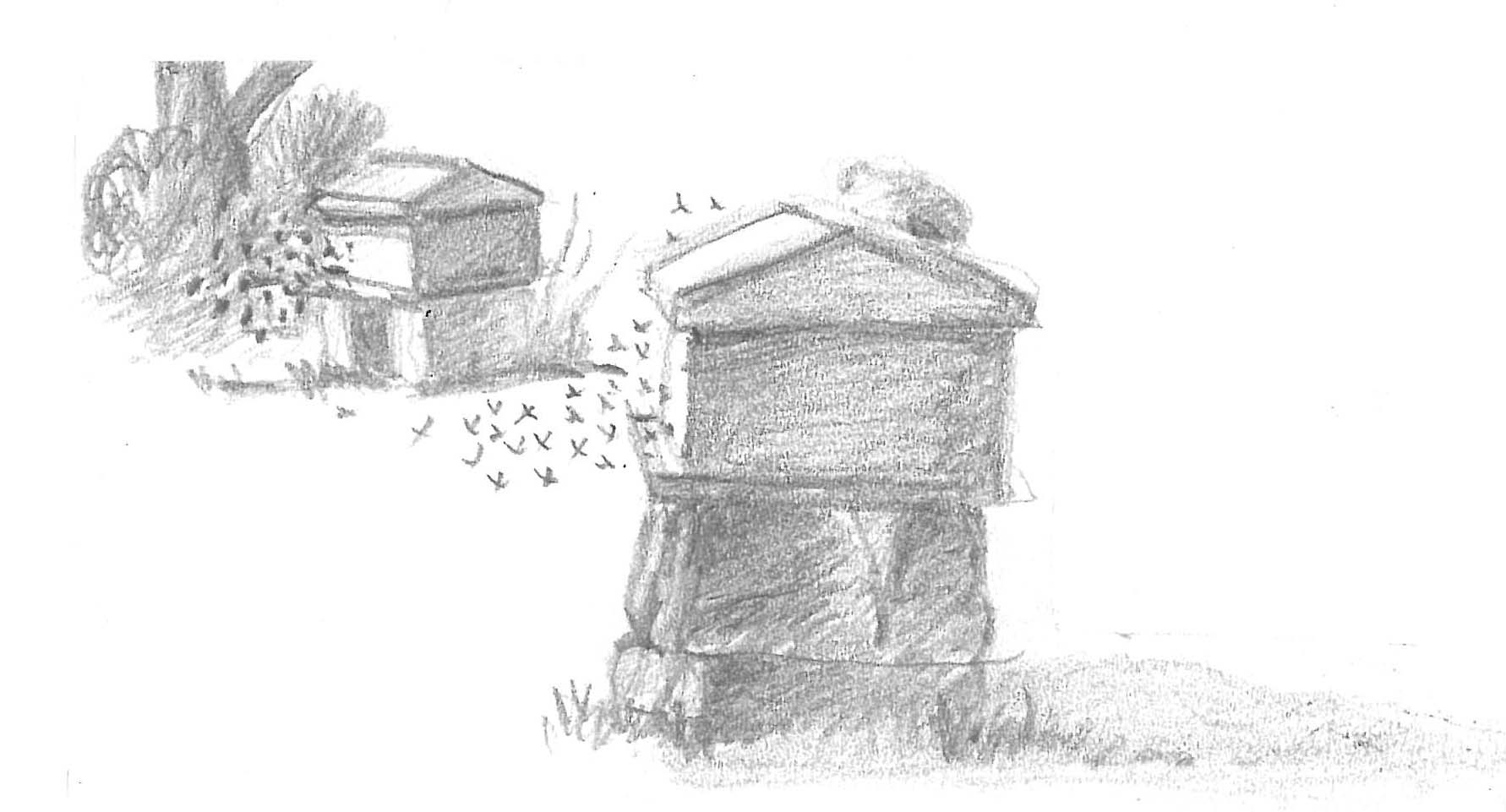| Prepare
yourself for next beekeeping season: register for certification courses
(No. 62) - Techniques on Advanced Top-Bar Beekeeping with M.
Thiele, build top bar hives, read literature recommended
in distance course and fill in membership form. Natural beekeeping without
cruelty to animals, without frames, artificial parts of the comb, smoke
and expensive equipment. Become partner-apiary of the Centre for Ecological
Apiculture!
Here
you find everything you need as a beginner and as a professional: Courses,
also distance courses, classes in natural top bar hive beekeeping, training
to become a Partner-beekeeper, beekeeping supplies such as top bar hive,
natural beeswarms and further beekeeping equipment.
More
Infos: Centre for Ecological Apiculture,
contact:
e-mail
First
lessons in organic / ecological topbar beekeeping. Register
for distance course No 19!
No.
62 Training How to Become a Certified Partner-Apiary of the Centre for
Ecological Apiculture - Ecological Top bar hive Beekeeping (Semester
26)
Techniques on Advanced
Top-Bar Beekeeping with DI. M. Thiele
How to become a partner-beekeeper
of the Centre for Ecological Apiculture?
1. Find more information
on ecological beekeeping in German
and English language
2. Become
a member in the Club of Ecological Beekeepers and ask for more info
4. Register for
training
No.62 ecological beekeeping
Duration: two semester
(one Year).
Deadline for registration
summersemester 2025 (first time registration): End of January
Begin: April
Deadline for
registration wintersemester 2025/26 (first time registration): End of July
Beginn: October
Similar training
or practical experiences in ecological top bar hive beekeeping, a long
year membership and certificate
courses are able to reduce training period.
During the first
semester you'll have the opportunity to apply for first certificate and
Proficiency certificate of Centre for Ecological Apiculture. During second
semester certification of your apiary is going to be prepared and carried
out.
From Curriculum:
Lessons on Location
of bees colonies,
suitable landscapes
for organic / ecological beekeeping
on the character
of bees,
how to manage top
bar hives,
maintaining honeybees'
health,
preventive measures
and disease control, varroaresitence
how to obtain a
good practice in honey harvest,
how to handle bees,
how to find the
right time to go to the bees,
Lessons on processing,
materials, filling,
sieving, filtration,
on how to storage
honey,
discussion of
our standards in beekeeping
considering the
character of bees.
Part II:
Lessons on what
does the beekeeper need in the beginning?
On equipment and
tools;
on simple hives
mainly used in the world, especially top bar hive;
how to produce comb
honey, run honey, propolis, royal jelly, beesbread, beeswax according standards
of Centre for Ecological Apiculture;
maintaining honeybees'
health;
disease control
with organic acids
On price calculation
in this sector for high quality products
Part III:
Lessons on beekeeping
considering the character of bees;
what happens in
a beecolony?
On drones, queens,
workers, communication;
on population during
the year,
on temperature control
and critical temperature for the honeybee;
what do I need to
know, if I want to work together with the bees in order to strengthen the
colony?
How can I work with
the bees without doing an assault upon the colony?
On comb spacing,
combs, inspection of the hives,
swarm prevention/management
and control,
making new colonies
within swarming mood;
what are possible
results of artificial queen rearing ("grafting")?
On telluric and
extratelluric forces according M. Thun;
important honey,
pollen and propolis sources which are useful for ecological beekeeping
and which are not?
Types of bees suitable
for organic / natural beekeeping in different zones of the earth.
Lessions on quality
of beeproduce,
contents of honey,
residuals in beeproduce;
on honeyfalsification;
historical aspects
of honey adulteration;
legal honeyadulteration:
ultrafiltration
(permitted since
August 2003 in the EU);
more efficient methods
of quality control;
honey production
in different countries;
regulations and
labelling;
standards issued
by Centre for Ecological Apiculture
and international
certification system
How to get certified
according standards of
Centre for Social
Medicine and Natural Bee Therapy / Natural Apitherapy Research Centre?
on contents of honey
and residuals in beeproduce;
on "organic" quality
nowadays;
how to become a
certified organic beekeeper;
more on the significance
of the quality question.
On price calculation
for honey comb, comb in the comb and "run-honey"
final examinations:
Certificates I-III
Registration
form for No. 62
Become
a member in the Club of Ecological Beekeepers and ask for more info
No.
110 / 210 Training for Becoming an Expert of the Centre for Ecological
Apiculture (Semester 2026)
How to become an expert
of the Centre for Ecological Apiculture?
1. Find more information
on ecological beekeeping in German
and English language
2. Become
a member in the Club of Ecological Beekeepers and ask for more info
3. Register for
training
No. 110 / 210
Duration: 4 semester
(2 years).
Deadline for registration
summersemester (first time registration): End of February
Begin: April
Deadline for
registration wintersemester (first time registration): End of July
Beginn: October
Precondition:
Recommended:
-
Training Nr. 62
-
B.Sc, M.Sc., Ph.D in
apiculture, biology, ecology
Registration
form
Become
a member in the Club of Ecological Beekeepers and ask for more info
Centre
for Ecological Apiculture
Natural
Apitherapy Research Centre
Akademie
der Kunst und Philosophie / Academy of Arts and Philosophy
DI.
M. Thiele, President and international Coordinator
Wissenschaftsbriefe
/ Api Review Letters / Science Review Letters
Save
the Bees, Bumblebees and Beecolonies
Zentrum
fuer wesensgemaesse Bienenhaltung
Beetherapy
/ Academy of Sciences
Copyright
© 2002-2025 Centre for Ecological
Apiculture
Last
update :2025/09/22
|

